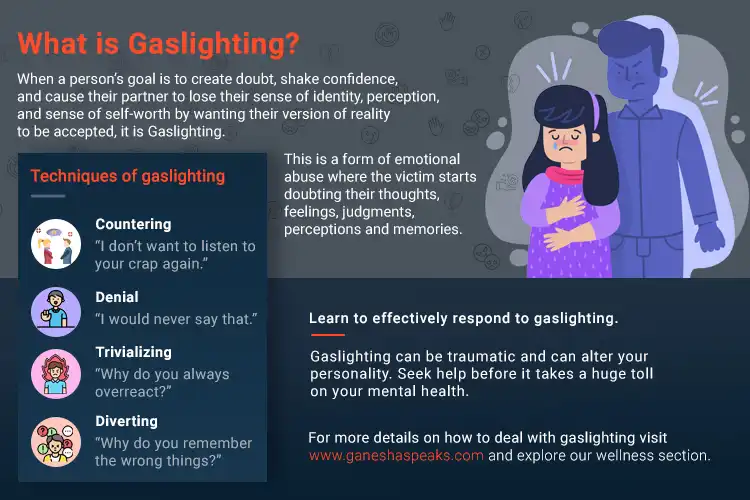Gaslighting is a form of psychological manipulation where one forces the other to question their own reality. Read on to know how the word “gaslighting” originated, how it impacts mental health, why it is challenging to resist, why people engage in it in the first place, and finally some examples towards the end.
What does Gaslighting Mean?
Gaslighting is a form of manipulation used to exert power over other individuals. It involves misleading the other individual, developing a deceptive narrative and making the other question their reasoning and experience.
People may second-guess events, memories, or even their identity due to gaslighting. In other words, if someone intentionally makes you feel like what you are perceiving is not real, they could be gaslighting you.
Gaslighting is majorly known in the context of romantic, intimate relationships, but it can also happen in multiple different settings, namely:
- Child-Parent Relationships
- Doctor-Patient Relationships
- Boss-Employee Relationships
- Political Gaslighting
- Discriminative Gaslighting (e.g. based on race, sex, caste, sexual orientation, etc.)
- Institutional Gaslighting
It can therefore be concluded that gaslighting is viable in any situation where the power dynamic has the potential to be imbalanced. Gaslighting is additionally a form of psychological and emotional abuse. While this form of abuse does not leave a physical injury, the intent is generally similar – to demean or control another individual.
Like any other action, gaslighting is on a continuum. The consistency, severity, and the ability or inability to acknowledge and rectify will all vary greatly.
Why is it called “Gaslighting”?
The term gaslighting originates from a 1940s play that was later turned into a movie (which was named – you guessed it – Gas Light). The story involves a manipulative man who attempts to make his wife believe that she is losing her sense of reality by slightly changing her surroundings – including gradually dimming the flame on a gas light.
Since this portrayal of emotional abuse was very close to the toxic and controlling ways individuals manipulate others, mental health professionals began officially labelling this behaviour as “gaslighting”.

How does Gaslighting Affect Mental Health?
The primary aim of gaslighting is to elicit a sense of self-doubt and uncertainty, which may be detrimental to the victim’s mental health. It significantly undermines an individual’s sense of self-belief. People on the receiving end of gaslighting may often experience:
- Confusion
- Frustration
- Anxiety
- Loss of focus
- Stress
- An inability to trust themselves
- Low Self-Esteem
In the long-term, continuous gaslighting may have the following consequences on the individual experiencing it:
- Depression
- Disorientation
- Trauma
- A sense of isolation
- A belief that they have a mental health disorder
- Hypervigilance (An extreme fear of danger)
- Suicidal Thoughts
Even seemingly non-threatening forms of gaslighting can profoundly impact mental health and should be taken seriously. Gaslighting is especially dangerous because recovery from it is difficult. However, it is not impossible.
If you are struggling with any of the above due to gaslighting, consider contacting our mental health professional.
Why does Gaslighting Work?
Gaslighting is often hard to identify and resist because the individuals want to trust the person gaslighting them, and also gain their approval. They (understandably) want to have faith in their partner, doctor, teacher, political leader, parent or boss. Individuals all have different insecurities, and when someone “trustworthy” comes along and gives them a reason to doubt themselves, they provide the individuals with an opportunity to bring out those insecurities.
So, if you find yourself or someone else being gaslighted, don’t suffer in silence. consider contacting our mental health professional.
Why do people Gaslight?
There isn’t a specific cause of gaslighting. Psychologists have different hypotheses as to what may lead to such manipulative behaviour. In simple terms, gaslighting may be done to gain a sense of control and superiority over the other individual. It may be an automatic response of some individuals to deflect responsibility.
If individuals were raised by gaslighting parents, it might be the mechanism they have learnt to cope with the world. This unhealthy behaviour might be the only way they believe they can survive amongst people.
There is additionally a possibility that gaslighters are unaware of what they are doing to others. They may not consciously recognise that what they are doing is harmful. Lastly, certain mental disorders like narcissistic personality disorder and antisocial personality disorder might also lead to the individual gaslighting others.
Examples of Gaslighting
You may have experienced small instances of gaslighting in your daily life. The most relatable example is when you may have gone into a conversation to share your discontent with another individual’s behaviour constructively, and you ended up apologising. There is also a chance you took on the role of the gaslighter when you did not want to own up to a mistake.
Certain phrases are common when someone is gaslighting:
- “That never happened.”
- “You’re too sensitive.”
- “You don’t really feel that way.”
- “You’re crazy/ You’re just being paranoid.”
- “I never said that.”
- “You’re imagining things.”
Another under-discussed dimension of the term is self-gaslighting. As the name suggests, this is not an interpersonal form of gaslighting. This generally manifests in the form of suppressing and invalidating your own feelings and thoughts.
It must be noted that there is a difference between humility and self-gaslighting. A humble individual will recognise their shortcomings but will not focus on them. On the other hand, someone who is self-gaslighting will never acknowledge their strengths and accomplishments.
Affordable Therapy available Digitally at Ganeshaspeaks.com



